WANTED: Writers from the Northern Mariana Islands
Saipan, CNMI – A quartet of local writers from the Northern Mariana Islands is accepting submissions for an upcoming anthology of local writers they are tentatively calling Stories from Wild Bills Cafe: Life, Love and Spicy Tofu in the Northern Mariana Islands.
“A number of local writers have been throwing around an idea to create a compilation of local work for years now,” said Angelo O’Connor Villagomez. “A group of us have been meeting together over spicy tofu and chiliburgers at Wild Bills these last few months and we’ve finally decided to put it together.”
When asked how long the anthology would be and how many writers would be included, Villagomez said that the book would be “about 200 pages, which will probably fit about 15 -20 writers.”
The editors of Wild Bills Café are Jane Mack, Joe Race, Jaime Vergara, and Villagomez.
The inspiration for the name of the anthology comes from Wild Bills Café on Beach Road in Garapan.
“I talked to the owner Bill about the name, and he’s allowing us to use it,” explained Race, a local novelist and former police officer. “Our idea is to focus the attention on a physical place to ground all the stories.”
Race also said that the book would promote the Northern Mariana Islands and might even turn Wild Bills into a destination for tourists, readers, and writers.
“Saipan, Tinian and Rota are home to several dozen newspaper reporters, bloggers, novelists, poets and amateur writers,” said Mack, a novelist and lawyer. “There are also a number of writers from the Northern Mariana Islands living and working abroad, but who write about home. These are the people we want to include in this first edition of Wild Bills.”
Writers interested in submitting work for the anthology can contact the editors at [email protected]. Submission guidelines are available upon request. Writers whose work is chosen for submission will receive two (2) copies of Stories from Wild Bills Café.
new posts in all blogs
 By: Jane Mack,
on 9/13/2010
By: Jane Mack,
on 9/13/2010
Blog: Saipan Writer (Login to Add to MyJacketFlap)
JacketFlap tags: Writing, Angelo Villagomez, Jane, submission opportunity, Stories from Wild Bill's, Joe Race, Jaime Vergara, Add a tag
 By: Jane Mack,
on 10/8/2008
By: Jane Mack,
on 10/8/2008
Blog: Saipan Writer (Login to Add to MyJacketFlap)
JacketFlap tags: Angelo Villagomez, Oreo, missing dog, Add a tag
 By: Jane Mack,
on 5/6/2008
By: Jane Mack,
on 5/6/2008
Blog: Saipan Writer (Login to Add to MyJacketFlap)
JacketFlap tags: Pew Charitable Trust, Governor Benigno R. Fitial, WESPAC, National Marine Monument, John Gourley, Angelo Villagomez, Add a tag
Our CNMI students participate in Mock Trial, write essays and debate over legal issues, and probably know more than our Governor about the meaning of a court's decision. It's called "finality" --that attribute of a court decision when all appeals are exhausted. And it means that the matter is SETTLED, OVER, FINITE, DONE, RESOLVED, and FINAL. The CNMI litigated and lost the submerged lands issue. There is no longer a dispute between the U.S. and the CNMI about this matter. And the Governor's foolish adherence to a claim that has been lost has no merit.
It certainly isn't a reason to reject a proposal to save our oceans and promote conservation before we've ruined beyond redemption the entire globe.
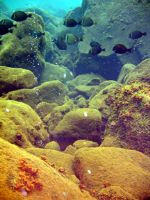 In the Pacific Ocean at Maug.
In the Pacific Ocean at Maug.
If we don't limit ourselves, we will deplete our natural world.
No one. The creation of the sanctuary can be done to allow anyone who is currently invested in fishing in those waters a time period to recoup their investment and withdraw from fishing there. In Hawaii, the few fishing interests in the area that was eventually protected by the marine monument were given 5 years to keep fishing.
But again, I ask, who is fishing around Uracas, Maug, and Asuncion?
Right now, according to Pete A. in his State of the Commonwealth address, there is satellite evidence that these waters are being poached. The CNMI is not protecting anything, and not benefiting either. Better to protect the area than let it be devastated by poaching and unrestricted use.
Conserving our marine environment is not ceding a cultural heritage. Letting WESPAC and its henchmen get to our Legislators and officials to vote against protecting our marine environment is ceding our cultural heritage.
The most vocal opposition to the marine sanctuary has come from John Gourley, who is on the advisory panel for WESPAC. WESPAC is a federal agency that promotes fishing--and right now, the FISHING interests are in control of our oceans. Their financial interest is to take as much as they can get away with, and they have caused tremendous damage to the world's oceans, as reported in numerous scientific and popular journals and newspapers.
This commercial fishing is NOT our cultural heritage, where islanders took small amounts of fish for what they needed on any given day. Now we have fishing vessels scooping up everything, and throwing back into the ocean dead creatures--the "by-catch" they don't want, keeping the haul that is commercially viable for them.
This commercial fishing is not the CNMI's cultural heritage. This harm to the ocean is not the CNMI's cultural heritage. This failure to respect the marine environment is not our cultural heritage.
Why is our Governor embracing this type of harm and speaking of it as our cultural right? Didn't we learn anything from the problems with the garment industry? When you choose as your livelihood something that hurts people or the world, it's not a sound basis for an economy. "Our" garment industry brought us shame and a horrible world image, bad press, and a scarred moral compass. The Governor may have gotten rich off it, but that doesn't mean it was good for the CNMI.
Tourism, on the other hand, invites people to share our islands, our culture, our lives. It offers respite and recreation. This is a sound economic choice.
Our tourism industry is declining, but we can turn that around with good decisions. A healthy commitment to a clean and conserved natural environment would be a huge step in the right direction.
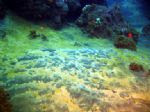 Volcanic sulfur bubbles at Maug.
Volcanic sulfur bubbles at Maug.
Instead, our Governor wants to now promote a joint venture with WESPAC? Commercial fishing where we rape our waters of what little is left? Do we really think that commercial fishing, as it presently exists, is going to improve our world? Is it a sound basis for our economy?
No. At present, it's depleting our oceans.
Why do we turn a blind eye to the damage these fishing interests and the U.S. government's WESPAC agency is doing? Because there are liars and cheats among us, people willing to twist the facts and prey on fears and prejudices to get what they want, to keep their pockets full while emptying us of our world's natural resources.
If that's not what is meant by commercial fishing, if commercial fishing insists that it believes in protecting the oceans, too--then let it support a marine sanctuary. Why can't we protect 1/3 of the ocean around the CNMI with a marine sanctuary? Isn't 2/3 of the EEZ enough for fishing?
One of the most important protections the globe has is from the ocean's coral
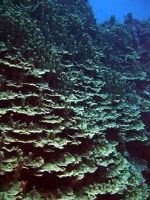 Coral layers at Maug.
Coral layers at Maug.
--more significant than rain forests. And our ocean health depends on complete and healthy eco-systems. Why do we not want to protect 1/3 of our waters? That may not be enough, but at least it's something! We have a chance to do our part. Let's do it!
What do you see happening here in the CNMI? Angelo Villagomez, on behalf of Pew Charitable Trust, is going out getting comments, talking with people. We already have public involvement.
In the Hawaii process, Angelo reported that there were hundreds of thousands of comments taken, both before and after the designation--comments that were considered, comments that helped shape the eventual final project.
Instead, it is the Governor who is shutting down the process, not letting us be heard!
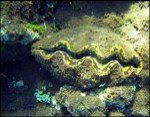
If this were true, how would it weigh against a marine sanctuary? Would we be worse off? NO! NO! NO! The Coast Guard patrols now, and the Coast Guard patrols after a designation of the area as a marine sanctuary. We'd like it to be better; we'd like it to have more money; but that is no reason to say we don't want to protect this marine environment!
We don't want an "inside" group permanently forcing a decision on us without our consent, either! This is a democracy! How many public hearings has the Governor or the Legislature held on this issue? HOW DARE YOU SPEAK as if you know what the public wants when you have done NOTHING to find out! The decision is too important to be left to Charles Reyes Jr. or Governor Fitial.
Please make the stupidity stop. Make corruption stop. Make the devastation of our natural world stop!
Prevent WESPAC from doing further damage. Wrest these waters from their control and protect the EEZ around Uracas, Maug, and Asuncion by making them into a marine monument!
Photos from MARAMP, the CNMI DPL, and Sarah Poznay.
.jpg?picon=623) By: Terry Lee Wilde,
on 11/3/2007
By: Terry Lee Wilde,
on 11/3/2007
Blog: Wilde Teen Books (Login to Add to MyJacketFlap)
JacketFlap tags: query letters, writing workshop, synopsis, hooking the reader, back cover blurbs, opening hooks, cliff hangers, online writing workshop, writing workshop, opening hooks, cliff hangers, online writing workshop, hooking the reader, back cover blurbs, synopsis, Add a tag
Viewing: Blog Posts Tagged with: back cover blurbs, Most Recent at Top [Help]
Results 1 - 4 of 4
Blog: Saipan Writer (Login to Add to MyJacketFlap)
JacketFlap tags: Writing, Angelo Villagomez, Jane, submission opportunity, Stories from Wild Bill's, Joe Race, Jaime Vergara, Add a tag
0 Comments on Stories from Wild Bill's as of 1/1/1900
Add a Comment
Blog: Saipan Writer (Login to Add to MyJacketFlap)
JacketFlap tags: Angelo Villagomez, Oreo, missing dog, Add a tag
Angelo Villagomez is looking for his dog, Oreo, who was last seen around Garapan Tuesday, 10/7 about 6 PM. He's still missing. If you find him, collect him (he's a people-friendly animal) and notify Angelo.
1 Comments on 283. Find Oreo--FOUND!!!, last added: 10/27/2008
Display Comments
Add a Comment
Blog: Saipan Writer (Login to Add to MyJacketFlap)
JacketFlap tags: Pew Charitable Trust, Governor Benigno R. Fitial, WESPAC, National Marine Monument, John Gourley, Angelo Villagomez, Add a tag
Stupidity by our elected officials.
Governor Fitial wrote to President Bush saying NO to a national marine monument in the Marianas Trench at Uracas,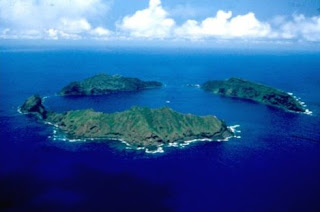
Maug,
and Asuncion.
He spoke of the longstanding dispute between the U.S. and CNMI governments over the ownership and management of submerged lands around the Northern Marianas.
Our CNMI students participate in Mock Trial, write essays and debate over legal issues, and probably know more than our Governor about the meaning of a court's decision. It's called "finality" --that attribute of a court decision when all appeals are exhausted. And it means that the matter is SETTLED, OVER, FINITE, DONE, RESOLVED, and FINAL. The CNMI litigated and lost the submerged lands issue. There is no longer a dispute between the U.S. and the CNMI about this matter. And the Governor's foolish adherence to a claim that has been lost has no merit.
It certainly isn't a reason to reject a proposal to save our oceans and promote conservation before we've ruined beyond redemption the entire globe.
He is also concerned that the designation would restrict the indigenous people's ability to fish and conduct related activities in the proposed site.Why is it that we are concerned that conservation limits our activities? Of course it does. That's its purpose. We need those limits because our natural resources are limited.
 In the Pacific Ocean at Maug.
In the Pacific Ocean at Maug.If we don't limit ourselves, we will deplete our natural world.
“We rely on fishing as a source of food and jobs.We do not depend on fishing in the waters around the three northern-most islands for anything. We're not fishing there. Who has jobs that relate to industry or fishing around Uracas, Maug, or Asuncion that would be lost by creation of a marine sanctuary?
No one. The creation of the sanctuary can be done to allow anyone who is currently invested in fishing in those waters a time period to recoup their investment and withdraw from fishing there. In Hawaii, the few fishing interests in the area that was eventually protected by the marine monument were given 5 years to keep fishing.
But again, I ask, who is fishing around Uracas, Maug, and Asuncion?
Right now, according to Pete A. in his State of the Commonwealth address, there is satellite evidence that these waters are being poached. The CNMI is not protecting anything, and not benefiting either. Better to protect the area than let it be devastated by poaching and unrestricted use.
Those who live in the CNMI have no interest in ceding their cultural heritage to the federal government under the auspices of environmental protectionism,” he said.
Conserving our marine environment is not ceding a cultural heritage. Letting WESPAC and its henchmen get to our Legislators and officials to vote against protecting our marine environment is ceding our cultural heritage.
The most vocal opposition to the marine sanctuary has come from John Gourley, who is on the advisory panel for WESPAC. WESPAC is a federal agency that promotes fishing--and right now, the FISHING interests are in control of our oceans. Their financial interest is to take as much as they can get away with, and they have caused tremendous damage to the world's oceans, as reported in numerous scientific and popular journals and newspapers.
This commercial fishing is NOT our cultural heritage, where islanders took small amounts of fish for what they needed on any given day. Now we have fishing vessels scooping up everything, and throwing back into the ocean dead creatures--the "by-catch" they don't want, keeping the haul that is commercially viable for them.
This commercial fishing is not the CNMI's cultural heritage. This harm to the ocean is not the CNMI's cultural heritage. This failure to respect the marine environment is not our cultural heritage.
The governor argued that the Commonwealth is looking at fishery as an economic growth engine to replace the declining garment and tourism industries. He said the loss of about 115,000 square miles of ocean area due to inclusion in a national monument would significantly impact this economic effort.
Why is our Governor embracing this type of harm and speaking of it as our cultural right? Didn't we learn anything from the problems with the garment industry? When you choose as your livelihood something that hurts people or the world, it's not a sound basis for an economy. "Our" garment industry brought us shame and a horrible world image, bad press, and a scarred moral compass. The Governor may have gotten rich off it, but that doesn't mean it was good for the CNMI.
Tourism, on the other hand, invites people to share our islands, our culture, our lives. It offers respite and recreation. This is a sound economic choice.
Our tourism industry is declining, but we can turn that around with good decisions. A healthy commitment to a clean and conserved natural environment would be a huge step in the right direction.
 Volcanic sulfur bubbles at Maug.
Volcanic sulfur bubbles at Maug.Instead, our Governor wants to now promote a joint venture with WESPAC? Commercial fishing where we rape our waters of what little is left? Do we really think that commercial fishing, as it presently exists, is going to improve our world? Is it a sound basis for our economy?
No. At present, it's depleting our oceans.
Why do we turn a blind eye to the damage these fishing interests and the U.S. government's WESPAC agency is doing? Because there are liars and cheats among us, people willing to twist the facts and prey on fears and prejudices to get what they want, to keep their pockets full while emptying us of our world's natural resources.
If that's not what is meant by commercial fishing, if commercial fishing insists that it believes in protecting the oceans, too--then let it support a marine sanctuary. Why can't we protect 1/3 of the ocean around the CNMI with a marine sanctuary? Isn't 2/3 of the EEZ enough for fishing?
One of the most important protections the globe has is from the ocean's coral
 Coral layers at Maug.
Coral layers at Maug.--more significant than rain forests. And our ocean health depends on complete and healthy eco-systems. Why do we not want to protect 1/3 of our waters? That may not be enough, but at least it's something! We have a chance to do our part. Let's do it!
Further, the governor said, Hawaii's experience with its marine monument showed a lack of procedural safeguards to ensure public involvement and environmental review during the designation process.Now that sounds like a straight-out lie.
What do you see happening here in the CNMI? Angelo Villagomez, on behalf of Pew Charitable Trust, is going out getting comments, talking with people. We already have public involvement.
In the Hawaii process, Angelo reported that there were hundreds of thousands of comments taken, both before and after the designation--comments that were considered, comments that helped shape the eventual final project.
Instead, it is the Governor who is shutting down the process, not letting us be heard!
Press secretary Charles P. Reyes Jr. said that federal enforcement funding may be a concern. He said the U.S. Coast Guard was not given any additional money or resources to extend patrols in Hawaii's monument area, and a similar scenario is likely if a Northern Marianas monument is created.

If this were true, how would it weigh against a marine sanctuary? Would we be worse off? NO! NO! NO! The Coast Guard patrols now, and the Coast Guard patrols after a designation of the area as a marine sanctuary. We'd like it to be better; we'd like it to have more money; but that is no reason to say we don't want to protect this marine environment!
“The people of the CNMI and their elected leaders do not want an outside group to permanently force a decision on them without their consent. This decision is too important to be left to Pew and their supporters. The people of the CNMI must decide if they want to give up a resource forever and forego all other opportunities or developments. This is democracy.”
We don't want an "inside" group permanently forcing a decision on us without our consent, either! This is a democracy! How many public hearings has the Governor or the Legislature held on this issue? HOW DARE YOU SPEAK as if you know what the public wants when you have done NOTHING to find out! The decision is too important to be left to Charles Reyes Jr. or Governor Fitial.
Please make the stupidity stop. Make corruption stop. Make the devastation of our natural world stop!
Prevent WESPAC from doing further damage. Wrest these waters from their control and protect the EEZ around Uracas, Maug, and Asuncion by making them into a marine monument!
Photos from MARAMP, the CNMI DPL, and Sarah Poznay.
1 Comments on 227. Please Make It Stop!, last added: 5/6/2008
Display Comments
Add a Comment
Blog: Wilde Teen Books (Login to Add to MyJacketFlap)
JacketFlap tags: query letters, writing workshop, synopsis, hooking the reader, back cover blurbs, opening hooks, cliff hangers, online writing workshop, writing workshop, opening hooks, cliff hangers, online writing workshop, hooking the reader, back cover blurbs, synopsis, Add a tag
The online workshop is a success! Very lively group--super discussion. If you missed out on joining the class for the month of November, it will be offered again in February.
Slow starts and sleepy endings to scenes and chapters can ruin a manuscript's chance of being published. Conversely, solid hooks can make the sale. Setting such practical matters aside, what author wouldn't be thrilled to hear someone say, "I couldn't put the book down"? Strong hooks are a vital ingredient in strong writing. In this online class, which features lectures, discussion, practical exercises, and handouts, I'll teach students how to captivate readers with great openings, scene hooks, chapter cliff hangers, and intriguing back cover blurbs. Participants will master the hook in all its environments, from the query letter through the novel.
To register for class:
PASIC (Published Author Special Interest Chapter, RWA)
www.pasic.net/classes.html
PASIC (Published Author Special Interest Chapter, RWA)
www.pasic.net/classes.html
0 Comments on Engaging the Reader from Start to Finish as of 1/1/1900
Add a Comment




Thanks for helping me find Oreo!